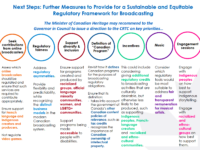The Broadcasting Act blunder series has emphasized the uncertainty associated with Bill C-10, highlighting how the bill removes foundational broadcast policies such as Canadian broadcast ownership requirements and leaves many specifics to the CRTC to sort out in a future hearing. In fact, even as Canadian Heritage Minister Steven Guilbeault claims that the bill establishes economic thresholds, excludes news services, or result in a billion dollars in new funding, the reality is that the bill does not specify any of these things. Rather, Guilbeault is presumably assuming that the Commission will decide to do so. If all of this uncertainty were not enough, Guilbeault has promised another layer of uncertainty, committing to release a policy direction to the CRTC should the bill become law.
 Articles by: Michael Geist
Articles by: Michael Geist
The Law Bytes Podcast, Episode 73: The Broadcasting Act Blunder – Why Minister Guilbeault is Wrong
Canada is currently considering major reforms to how it regulates Internet services. Canadian Heritage Minister Steven Guilbeault’s Bill C-10 would dramatically reshape the Broadcasting Act by regulating foreign Internet sites and services with the prospect of mandated registration, payments to support Canadian content, confidential data disclosures, and discoverability requirements. The bill would also remove policies supporting Canadian ownership of the broadcasting system and reduce expectations about Canadian participation in film and television productions. This week’s Law Bytes podcast takes a closer look at the implications of the bill, examining key concerns discussed in my ongoing Broadcasting Act blunder blog series.
The Broadcasting Act Blunder, Day 16: Mandated Payments and a Reality Check on Guilbeault’s Billion Dollar Claim
The Broadcasting Act blunder series has identified many of the negative consequences stemming from Bill C-10: the beginning of the end of Canadian broadcast ownership requirements, downgrading the role of Canadians in their own productions, risks to Canadian intellectual property ownership, trade retaliation by the U.S., potential capture of news sites and smaller streaming services, and less consumer choice as services work to avoid the costly Canadian regulatory requirements. Yet for some these costs will still be worth it since their singular goal is to mandate that foreign streaming services contribute funding toward Canadian film and television production. Indeed, Canadian Heritage Minister Steven Guilbeault has made this the centrepiece of his “get money from web giants” strategy claiming that this will result in a billion dollars a year by 2023 in new funding. As this post documents, those claims massively exaggerate the likely funding impact.
The Broadcasting Act Blunder, Day 15: Mandated Confidential Data Disclosures May Keep Companies Out of Canada
The Broadcasting Act blunder series has highlighted Bill C-10’s many regulatory requirements for Internet services including registration, regulations, CRTC-imposed conditions, discoverability requirements, and (in an upcoming post) mandated payments. There is another requirement that may raise the ire of some foreign services and force them to consider blocking the Canadian market. The bill establishes significant confidential data disclosure requirements as a condition that may be imposed on Internet services both big and small around the world.
The Broadcasting Act Blunder, Day 14: The Risk to Canadian Ownership of Intellectual Property
The Broadcasting Act blunder series has previously examined Bill C-10’s enormous cost to the foundational elements of Canadian broadcasting policy including the beginning of the end of Canadian ownership and control requirements and how it downgrades the role of Canadians in their own programming. There is another significant cost that comes from a bill that Andrew Coyne of the Globe and Mail describes as “one of the most radical expansions of state regulation in Canadian history.” At a time when the government has emphasized the importance of intellectual property, the bill opens the door to less Canadian control and ownership over its IP.











